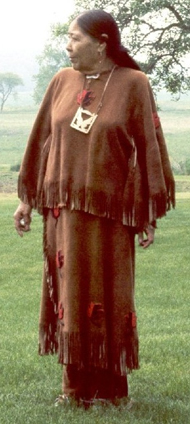Nora Thompson Dean facts for kids
Nora Thompson Dean (born July 3, 1907 – died November 29, 1984) was an important member of the Delaware Tribe of Indians. Her Lenape name was Weenjipahkihelexkwe, which means "Touching Leaves Woman." She was a traditional leader and one of the last people to speak the southern Unami dialect of the Lenape language fluently. She taught many younger tribal members and is often mentioned in studies about Lenape culture.
Contents
Nora's Early Life and Education
Nora Thompson was born on July 3, 1907, in Glen Oak, Oklahoma. Her parents, James H. and Sarah (Wilson) Thompson, were both full-blood Delawares. Nora went to public schools in Oklahoma. She graduated from Midway School in 1921 and from Dewey High School in 1925. She also had some nursing training and took university classes. In 1941, she married Charley Dean. She passed away on November 29, 1984.
The Meaning of "Touching Leaves Woman"
Nora's Lenape name, Weènchipahkihëlèxkwe, means "Touching Leaves Woman." This special name was given to her by her mother, Sarah Wilson Thompson. It came from a vision her mother had.
One day, Nora's mother, Sarah, was riding a horse with her aunt, Way-lay-luh-mah. Her aunt suddenly fainted, and they both fell off the horse. Sarah was very scared. But then, she saw some trees that seemed to turn into people. They told her not to be afraid and offered to help. As Sarah listened, the leaves on the trees began to rustle and sing a song to her. This song became very important to Sarah and was later sung in the Lenape Big House ceremonies. Nora's name, "Touching Leaves Woman," comes from this powerful vision.
Working to Preserve Lenape Culture
Nora Thompson Dean grew up learning the traditional ways of her people. She spent her life making sure these traditions stayed alive. She taught others about Lenape religious ceremonies, social gatherings, dances, and how to make traditional crafts. She also shared her knowledge of herbal medicines and the Lenape language. Many tribal members and experts, like anthropologists and linguists, asked for her advice.
Sharing Lenape Crafts
In 1967, Nora started a business called Touching Leaves Indian Crafts. Through this business, she sold traditional Lenape clothing and other handmade items. She won awards for her beautiful craftwork. She was also recognized for her efforts to promote the Lenape way of life. She received honors from the Oklahoma House of Representatives and the Governors of Oklahoma, Delaware, and Pennsylvania. She also received an award from the Archaeological Society of New Jersey.
Attending Cultural Gatherings
Nora was active in many cultural events. In 1972, she took part in the Delaware Indian Symposium. This event brought together scholars and tribal members from Oklahoma and Canada. She also spoke at another important Delaware cultural gathering in 1981.
Later in her life, Nora continued her work. She created artwork, taught students at her home, and gave lectures at universities. She also demonstrated Lenape artwork at museums and prepared educational materials to sell through her business. Oklahoma governor George Nigh even named her an "Oklahoma Ambassador of Good Will."
After Nora's death, her husband donated seeds of Lenape Blue Corn to the USDA. This special type of corn had been grown by the Lenape people for a long time and was brought west by Nora's mother.
Protecting the Unami Language
Nora Thompson Dean created important learning materials, including four Lenape Language Lessons. These sound recordings, along with others made with Nora and other Lenape elders, have been digitized. They are now part of the Lenape Talking Dictionary, a project funded by the National Science Foundation. This project helps people learn and preserve the Unami language. Nora's brother, Edward Leonard Thompson (1904–2002), was the last person in the United States to speak Unami as his first language.
Nora's Passing
Nora Thompson Dean passed away on November 29, 1984. She is buried in the Delaware Indian Cemetery in Dewey, Oklahoma.
 | Anna J. Cooper |
 | Mary McLeod Bethune |
 | Lillie Mae Bradford |


